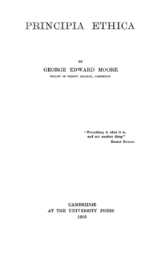
George Edward Moore
George Edward Moore also known as G. E. Moore, was a philosopher at the University of Cambridge. He is perhaps best known for his work in ethics and is often regarded as one of the founders of the analytic school in philosophy.
Sourced
- By far the most valuable things, which we know or can imagine, are certain states of consciousness, which may roughly be described as the pleasures of human intercourse and the enjoyment of beautiful objects. No one, probably, who has asked himself the question, has ever doubted that personal affection and the appreciation of what is beautiful in Art of Nature, are good in themselves; nor, if we consider strictly what things are worth having purely for their own sakes, does it appear probable that any one will think that anything else has nearly so much value as the things which are included under these two heads.
- Principia Ethica (1903; revised edition, Cambridge University Press, 1993)
- I can prove now, for instance, that two human hands exist. How? By holding up my two hands, and saying, as I make a certain gesture with the right hand, "Here is one hand," and adding, as I make a certain gesture with the left, "and here is another." And if, by doing this, I have proved ipso facto the existence of external things, you will all see that I can also do it now in numbers of other ways: there is no need to multiply examples.
- "Proof of an External World," Proceedings of the British Academy 25 (1939)
Unsourced
- It is raining but I don't believe that it is.
- Moore discussed this sentence in a lecture, which is not available in print. This sentence is not logically contradictory, and yet it seems that no one could make a true assertion by sincerely speaking it. It is reported that Ludwig Wittgenstein, on hearing of Moore's lecture, went to Moore's house in the middle of the night to ask him to repeat it. This problem is known as "Moore's paradox."
